International Affairs
 |
 |
 |
 |
 |
 |
 |
Making America Socialist - Part I
Conquering & Reconquering the Americas
The rich history of Spain includes the episodes of the Reconquista (Reconquest) of almost all its territory that had been invaded by the Muslims, who ruled the Iberian Peninsula for eight centuries. The heroic Reconquista was led by great heroes like Don Pelayo, El Cid and the Catholic Kings.
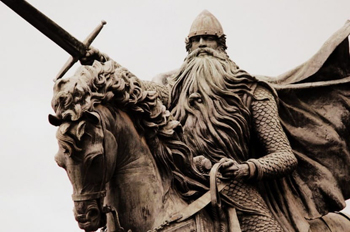
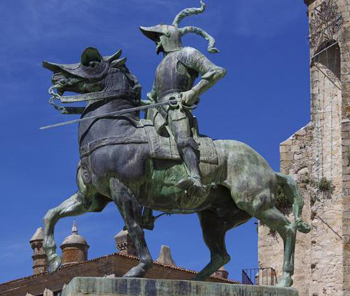 As soon as the Reconquista ended and the Kingdom was unified, the Spanish Crown entered the conquest of the New World, which resulted in the discovery and colonization of the three Americas.
As soon as the Reconquista ended and the Kingdom was unified, the Spanish Crown entered the conquest of the New World, which resulted in the discovery and colonization of the three Americas.
During the Age of Discovery, many Spanish missionaries, nobles and plebeians came to America to expand the Catholic Faith, implant a Christian Civilization and seek wealth. For the latter reason, when someone said, "He went to make America," it was silently interpreted as, “He went to America to make money and become rich.”
After centuries the Spanish influence in the Americas is still alive and strong. Now, however, many of those who cross the Ocean do not come to expand the Catholic Faith, but to expand the Revolution and to subject the peoples of American nations to a socialist slavery.
Today social networks allow us to know almost everything quickly. And so it is not difficult to know about the overseas adventures upon which the Iberian neo-socialists have embarked. Among such ventures, they inspired the strategies of the São Paulo Forum (a coalition of leftist political parties of Latin America launched by the communist Worker's Party of Brazil in 1990) and set out to conquer the governments of various Latin American countries for Socialism.
Their action was financed by money of obscure origin, as I intend to demonstrate in this series. Their main contributors have been the Venezuelan dictators Hugo Chávez and now Nicolas Maduro, the Bolivian Marxist government of Evo Morales, and the communist government of Rafael Correa in Ecuador. After "making America socialist," they returned to Spain and established the left-wing Podemos party in 2014 to take power there with abundant funds.
Points in common
Investigating the methodology used by those socialist Spaniards in several South American countries to take power, we consistently find the following elements, with tactical adaptations for the needs of each country:
Ideology: Bolivarianism or Socialism of the 21st Century
Bolivarianism is a current of political thought with pan-American, socialist and national-patriotic ideals set against the injustices of imperialism, inequality and corruption. As an ideology, it has been developed and promoted by Latin American parties that have proclaimed themselves left-wing Marxists grouped together in the São Paulo Forum. (Reference text here)
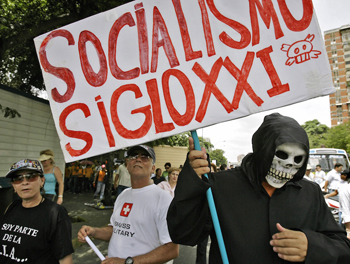 Socialism of the 21st Century is an interpretation of socialist principles first advocated by the German sociologist and political analyst Heinz Dietrich in 1996. The term spread worldwide after President Hugo Chávez mentioned it during a speech at the 5th World Social Forum on January 30, 2005. According to Dietrich's work Socialism of the 21st Century, this Socialism has democratic socialist elements, but it primarily resembles
Marxist revisionism.
Socialism of the 21st Century is an interpretation of socialist principles first advocated by the German sociologist and political analyst Heinz Dietrich in 1996. The term spread worldwide after President Hugo Chávez mentioned it during a speech at the 5th World Social Forum on January 30, 2005. According to Dietrich's work Socialism of the 21st Century, this Socialism has democratic socialist elements, but it primarily resembles
Marxist revisionism.
Dietrich found the practical application of his theories in Venezuela's Chavism, a government that he helped to advise until 2007. Leaders who have advocated for this form of Socialism also include Néstor Kirchner of Argentina, Rafael Correa of Ecuador, Evo Morales of Bolivia and Luiz Inácio Lula da Silva of Brazil. (Reference text here)
Strategy of conquest:
The primary means used to attain power under this new form of Socialism is by using the Constituent Assembly to change the Constitution: Bolivia, Ecuador and Venezuela all changed their constitutions during the respective presidencies of Evo Morales, Rafael Correa and Hugo Chávez.
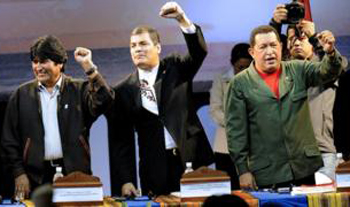 Professor-emeritus of the Central University of Venezuela Allan Brewer-Carías comments: "Populist movements, at least in the recent world and in Latin America, have come to power at the expense of the Constitution.
Professor-emeritus of the Central University of Venezuela Allan Brewer-Carías comments: "Populist movements, at least in the recent world and in Latin America, have come to power at the expense of the Constitution.
"Constituent assemblies are called, with the aim of directly consulting the popular will vs. the established constitutions, and then approving magna cartas establishing mechanisms that weaken the fundamental elements of the Constitution.” (Reference text here)
Communications strategy:
In one of the principles he developed, Nazi propaganda expert Joseph Goebbels affirmed that all propaganda must be directed straight to the people, adapting its level to the least intelligent of that populace. The larger the group to convince, the smaller the mental effort to be made. The receptive capacity of the masses is limited and their comprehension weak; in addition, they have great facility to forget.
Analyzing the strategy of these governments, Journalist Sergio Ramos notes: “One of the most important mechanisms is to control the media. By enacting laws and decrees that censure the press, they curb and limit freedom of the press, thus reducing the power of information. Often they create a pseudo-legal climate to confiscate private media that will pass into the hands of the regime's organizations. In the end, they acquire a monopoly over communication by closing the people's free access to information. ” (Reference text here)
Economic control:
The State acquires power trough the confiscation, expropriation or nationalization of private companies, starting with the most prominent and strategic ones. At the same time, the government, under the protection of corruption without supervision, enriches the private coffers of the hierarchs of the new regime, or uses funds gained from drug cartels to further their revolutionary aims.
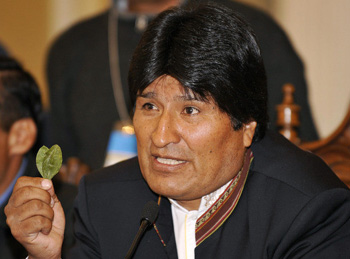 For example, journalist Jaime Bayly affirmed that Evo Morales did business with the Sinaloa drug cartel, gaining $250 million dollars annually, of which "two or three million" went to finance Pablo Iglesiass, Secretary General of the leftwing Spanish political party Podemos. Full text
here)
For example, journalist Jaime Bayly affirmed that Evo Morales did business with the Sinaloa drug cartel, gaining $250 million dollars annually, of which "two or three million" went to finance Pablo Iglesiass, Secretary General of the leftwing Spanish political party Podemos. Full text
here)
Along with sponsors like Hugo Chávez, Nicolás Maduro, Evo Morales and Rafael Correa, we find manipulators in the shadows like the Cuban government and the Forum de São Paulo.
Thus, we find left-wing organizations and communist movements coming together to establish a methodology and strategy that aims to impose totalitarian and dictatorial communist systems in Latin American countries, under the deceptive appearance of defending the rights of the people.
Continued

El Cid, hero of the Spanish epic; below, the great Spanish explorer Pizarro who discovered Peru

During the Age of Discovery, many Spanish missionaries, nobles and plebeians came to America to expand the Catholic Faith, implant a Christian Civilization and seek wealth. For the latter reason, when someone said, "He went to make America," it was silently interpreted as, “He went to America to make money and become rich.”
After centuries the Spanish influence in the Americas is still alive and strong. Now, however, many of those who cross the Ocean do not come to expand the Catholic Faith, but to expand the Revolution and to subject the peoples of American nations to a socialist slavery.
Today social networks allow us to know almost everything quickly. And so it is not difficult to know about the overseas adventures upon which the Iberian neo-socialists have embarked. Among such ventures, they inspired the strategies of the São Paulo Forum (a coalition of leftist political parties of Latin America launched by the communist Worker's Party of Brazil in 1990) and set out to conquer the governments of various Latin American countries for Socialism.
Their action was financed by money of obscure origin, as I intend to demonstrate in this series. Their main contributors have been the Venezuelan dictators Hugo Chávez and now Nicolas Maduro, the Bolivian Marxist government of Evo Morales, and the communist government of Rafael Correa in Ecuador. After "making America socialist," they returned to Spain and established the left-wing Podemos party in 2014 to take power there with abundant funds.
Points in common
Investigating the methodology used by those socialist Spaniards in several South American countries to take power, we consistently find the following elements, with tactical adaptations for the needs of each country:
Ideology: Bolivarianism or Socialism of the 21st Century
Bolivarianism is a current of political thought with pan-American, socialist and national-patriotic ideals set against the injustices of imperialism, inequality and corruption. As an ideology, it has been developed and promoted by Latin American parties that have proclaimed themselves left-wing Marxists grouped together in the São Paulo Forum. (Reference text here)

In Venezuela Socialism of the 21st century was installed with disastrous results
Dietrich found the practical application of his theories in Venezuela's Chavism, a government that he helped to advise until 2007. Leaders who have advocated for this form of Socialism also include Néstor Kirchner of Argentina, Rafael Correa of Ecuador, Evo Morales of Bolivia and Luiz Inácio Lula da Silva of Brazil. (Reference text here)
Strategy of conquest:
The primary means used to attain power under this new form of Socialism is by using the Constituent Assembly to change the Constitution: Bolivia, Ecuador and Venezuela all changed their constitutions during the respective presidencies of Evo Morales, Rafael Correa and Hugo Chávez.

Socialist leaders of Bolivia, Ecuador & Venezuela, united in purpose give the communist salute
"Constituent assemblies are called, with the aim of directly consulting the popular will vs. the established constitutions, and then approving magna cartas establishing mechanisms that weaken the fundamental elements of the Constitution.” (Reference text here)
Communications strategy:
In one of the principles he developed, Nazi propaganda expert Joseph Goebbels affirmed that all propaganda must be directed straight to the people, adapting its level to the least intelligent of that populace. The larger the group to convince, the smaller the mental effort to be made. The receptive capacity of the masses is limited and their comprehension weak; in addition, they have great facility to forget.
Analyzing the strategy of these governments, Journalist Sergio Ramos notes: “One of the most important mechanisms is to control the media. By enacting laws and decrees that censure the press, they curb and limit freedom of the press, thus reducing the power of information. Often they create a pseudo-legal climate to confiscate private media that will pass into the hands of the regime's organizations. In the end, they acquire a monopoly over communication by closing the people's free access to information. ” (Reference text here)
Economic control:
The State acquires power trough the confiscation, expropriation or nationalization of private companies, starting with the most prominent and strategic ones. At the same time, the government, under the protection of corruption without supervision, enriches the private coffers of the hierarchs of the new regime, or uses funds gained from drug cartels to further their revolutionary aims.

Evo Morales promoting "cocaine tourism" in Bolivia
Along with sponsors like Hugo Chávez, Nicolás Maduro, Evo Morales and Rafael Correa, we find manipulators in the shadows like the Cuban government and the Forum de São Paulo.
Thus, we find left-wing organizations and communist movements coming together to establish a methodology and strategy that aims to impose totalitarian and dictatorial communist systems in Latin American countries, under the deceptive appearance of defending the rights of the people.
Continued
Posted April 20, 2020
______________________
______________________
 Volume I |
 Volume II |
 Volume III |
 Volume IV |
 Volume V |
 Volume VI |
 Volume VII |
 Volume VIII |
 Volume IX |
 Volume X |
 Volume XI |
 Special Edition |